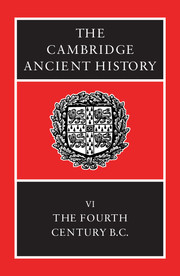Book contents
- Frontmatter
- 1 Sources and their uses
- 2 Sparta as victor
- 3 Persia
- 4 The Corinthian War
- 5 Sicily, 413–368 B.C.
- 6 The King's Peace and the Second Athenian Confederacy
- 7 Thebes in the 360s B.C.
- 8 Regional surveys I: Persian lands and neighbours
- 9 Regional surveys II: the West and North
- 10 Society and economy
- 11 The polis and the alternatives
- 12 Greek culture and science
- 13 Dion and Timoleon
- 14 Macedon and north-west Greece
- 15 Macedonian hegemony created
- 16 Alexander the Great Part 1: The events of the reign
- 17 Alexander the Great Part 2: Greece and the conquered territories
- 18 Epilogue
- Chronological Table
- BIBLIOGRAPHY
- Index
- Map 1: Greece and Western Asia Minor
- Map 9: Egypt
- Map 20: Alexanders campaigns
- References
1 - Sources and their uses
Published online by Cambridge University Press: 28 March 2008
- Frontmatter
- 1 Sources and their uses
- 2 Sparta as victor
- 3 Persia
- 4 The Corinthian War
- 5 Sicily, 413–368 B.C.
- 6 The King's Peace and the Second Athenian Confederacy
- 7 Thebes in the 360s B.C.
- 8 Regional surveys I: Persian lands and neighbours
- 9 Regional surveys II: the West and North
- 10 Society and economy
- 11 The polis and the alternatives
- 12 Greek culture and science
- 13 Dion and Timoleon
- 14 Macedon and north-west Greece
- 15 Macedonian hegemony created
- 16 Alexander the Great Part 1: The events of the reign
- 17 Alexander the Great Part 2: Greece and the conquered territories
- 18 Epilogue
- Chronological Table
- BIBLIOGRAPHY
- Index
- Map 1: Greece and Western Asia Minor
- Map 9: Egypt
- Map 20: Alexanders campaigns
- References
Summary
No guide comparable to Thucydides exists for the fourth century. This means that we have no firm framework for political and military events, and this lack is a serious obstacle to one sort of knowledge. Thucydides’ mind, however, was limited as well as powerful, or perhaps we should say its limits were the price of its power; and in the fourth century certain types of history which he had treated only selectively, particularly social, economic and religious topics, can actually be better studied than was possible in the Thucydidean period. Xenophon, for instance, has glaring faults when judged as a political reporter but is a prime source for the modern historian of religion. In general, fourth-century literary sources (Xenophon, Aeneas Tacticus and others) are less preoccupied than Thucydides had been with the polar opposites, Athens and Sparta. This probably reflects the new multi-centred reality. But we should recall that Thucydides, especially in books IV and V, had allowed us peeps at the politics of Argos, Macedon, Thessaly and Boeotia. A history of the Peloponnesian War written by Xenophon might have told us more about second-class and minor city states than Thucydides did: compare the remarkable detail about the minor cities Sicyon and Phlius at Xen. Hell. VII. 1–3. But a Xenophon with only Herodotus, not Thucydides, for a predecessor and model would have looked very different anyway.
- Type
- Chapter
- Information
- The Cambridge Ancient History , pp. 1 - 23Publisher: Cambridge University PressPrint publication year: 1994
References
- 1
- Cited by

